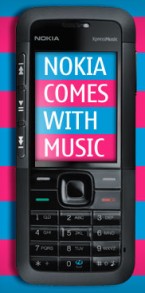
Nokia and I are in agreement over at least one thing: the company made mistakes when launching its all-you-can-eat music subscription offering “Comes With Music” in the UK. The service whereby you purchase a qualifying Nokia handset and then get access to the entire library of the Nokia Music Store for 12 – 18 months and get to keep any downloaded tracks once the subscription ends, was launched in the UK on two aging phones and with the backing of only one carrier and one retail chain.
Rob Taylor, vice president of Nokia Music, tells the Telegraph newspaper:
“The UK was our first launch market, and we learned a lot from that experience… We learned that the right device is just as important as what we’re offering. When we launched in the UK, the timing was such that we launched it with two devices that were slightly out of date.
That’s not really something that helped us in the UK at the time. But we learned from that, and subsequent launches in other countries with the [touch-screen] Nokia 5800, the hero device, are doing very, very well.”
Taylor also says that in future Nokia needs more retail partners for Comes With Music (other than Carphone Warehouse) and that the company would be back with the 5800. “We won’t give up on Comes with Music, or the UK.”
There was, however, no mention of other issues that I believe have held back adoption of the service. The use of Digital Rights Management is one potential, if overstated, deal breaker, and then there is the lack of carrier subsidy, and perhaps most importantly, poor messaging in the way Comes With Music has been marketed.
See: Why has Nokia’s ‘Comes With Music’ been a flop in the UK?
On a brighter note, Taylor says that both Nokia and the major record labels are encouraged with the way in which users have been using the service. From the Telegraph:
“Comes with Music users are downloading around 200-300 tracks in their first month,” he said. “Around 90 per cent of our usual sales from the Nokia Music Store are new songs. With Comes with Music, it’s the complete opposite. About 90 per cent of those downloads are from the back catalogue, and 10 per cent are new releases. It means people are enjoying music, and they’re enjoying the history of music. They’re going back and discovering not just one Rolling Stones album, but they’re looking at the whole discography.
“The music industry is pretty encouraged by this.”
